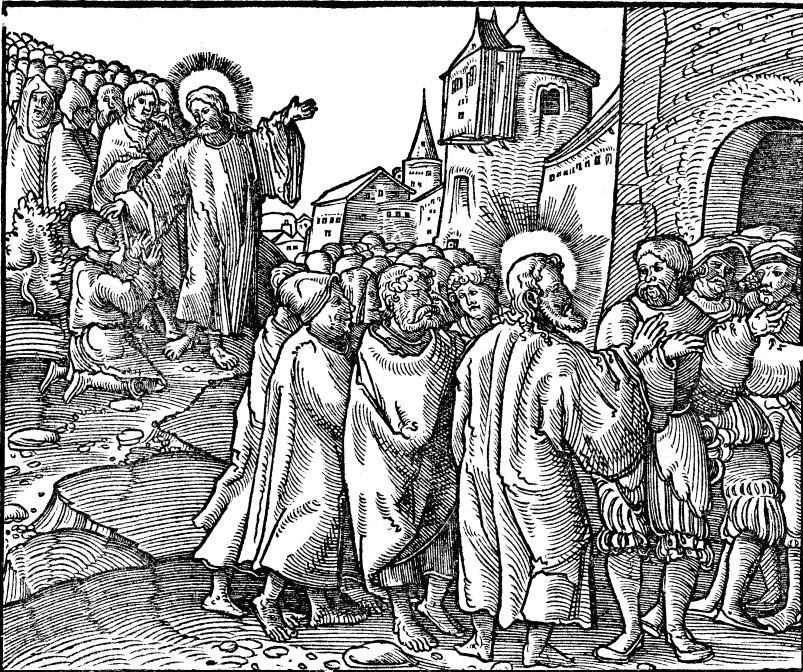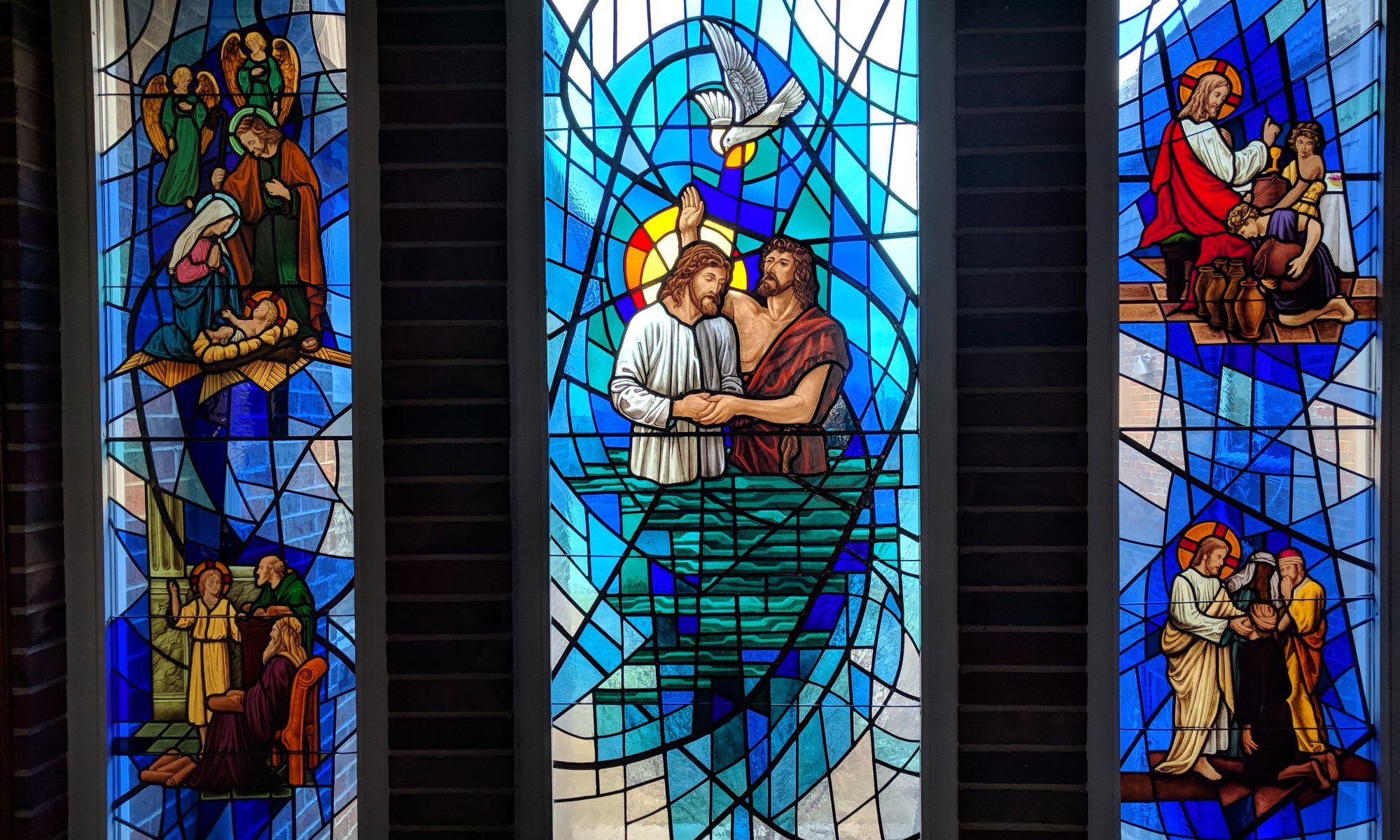
Lessons: 2 Kings 5:1-15, Romans 12:16-21, Matthew 8:1-13
Hymns: TLH 130, LSB 401, 412, 620, 632
Grace, mercy, and peace to you from God our Father and our Lord and Savior, Jesus Christ. Amen.
Today’s Gospel picks up right after Jesus preaches His Sermon on the Mount, which is early in our Lord’s ministry. Even before preaching that Sermon, great crowds followed Him. Matthew wrote that Jesus “went throughout all Galilee, teaching in their synagogues and proclaiming the gospel of the kingdom and healing every disease and every affliction among the people. So his fame spread throughout all Syria, and they brought him all the sick, those afflicted with various diseases and pains, those oppressed by demons, those having seizures, and paralytics, and he healed them” (Matt. 4:23-24).
Then Jesus sees the crowd, and so He goes up a mountain where He sits down and preaches. In those days, those who had something authoritative to say sat down while the rest stood to listen. In our day, we do the opposite. In fact, pastors preach from pulpits for a reason. They are heralds, called by God to proclaim God’s Word. Standing in the pulpit indicates that the pastor is not preaching himself but the very Word of God. Standing in the pulpit means the pastor is Christ’s ambassador to proclaim a serious, life-changing, life-giving Word.
I’ve seen pastors wander around the chancel when preaching. It may seem like they’re more relevant or relatable than those seemingly stodgy pastors who are stuck behind a pulpit. In the end, their actions are taking the focus off of Christ and placing it on themselves. They usually don’t mean to do this, but that’s what happens. They are not to simply give a talk, but are to proclaim the Law and the Gospel.
After Jesus preaches His Sermon on the Mount, He stands up and goes down the mountain, and great crowds follow Him. Then a leper makes a humble request. He kneels before Jesus, saying, “Lord, if you will, you can make me clean.” This is an excellent example of faith! Matthew does not tell us where he got this faith. Lepers have a skin disease, which is often contagious. As a result, they were forced to separate themselves from society. They were instructed to warn others of their leprosy by shouting, “Unclean! Unclean!” This caused them to live lonely and difficult lives. Could it be that the leper heard Jesus preach? Or did some in that crowd go and tell the leper the things Jesus said? We don’t know. But he learned who Jesus is and he trusted in Jesus, and he made his request before Jesus.
And this request serves as a great example for us. His request was humble, as he knelt before Jesus. His request was submissive to Jesus, for he acknowledged that he will only receive what the Lord wills. And his request was made with confidence, for the leper knew with absolute certainty that the Lord could make him clean again. In the same way, let’s make our petitions known before the Lord. Let’s submit ourselves to His good and gracious will. And let’s be confident, knowing that there’s nothing too hard for God to accomplish.
Upon healing the leper, Jesus says something peculiar. He said, “Don’t tell anyone.” Why shouldn’t the leper tell anyone? Why would he want to keep it a secret? After all, the miracles of Jesus demonstrate the important reality that Jesus is God in the flesh made manifest, and they show His love for us. But the miracles of Jesus do not get to the main reason for our Lord’s coming in the flesh. Jesus did not come just to extend the earthly lives of those He encountered, nor did He come just to make people feel comfortable. Instead, He came to become our sin, and pay the penalty for our sin in our place. He came to die on the cross so that we can be reconciled to God through the shedding of His Blood. And so the reason why Jesus instructs the leper not to tell anyone of his healing is rather simple. Jesus did not come to merely be a Physician of the body, but a Physician of souls. While temporary healing is nice, receiving the gift of eternal life is even better. It is better to focus on the needs of the soul than the needs of the body.
I suspect that is why the Holy Spirit guided St. Matthew to wait until the eighth chapter before we see a specific miracle of Jesus. Luke first records a miracle of Jesus in chapter 4 by driving out an unclean spirit and healing Peter’s mother-in-law. Mark reports these same things in chapter 1. And John in chapter 2 recounts our Lord’s first miracle when He turned water into wine. But Matthew comes first. If we read the New Testament from the beginning, we will first hear of the birth of Jesus, the ministry of John the Baptist, the Baptism of Jesus, and the temptation of Jesus. Then we will hear our Lord preach the Sermon on the Mount, which is three chapters long. Finally, after hearing His preaching, then we begin to hear Jesus perform miracles. Our focus, then, is on His Word.
God’s Word has power, and it works saving faith in us. This faith receives the blessings and promises of God. No one receives the forgiveness of sins Jesus earned on the cross apart from faith in Jesus. And the only way to obtain faith is through the Word, for the Holy Spirit does not wish to deal with us apart from the Word.
While faith will certainly want to obey our Lord’s instruction doing whatever He says, faith is not silent. Faith is filled with joy over the blessings received through faith. These people were astonished by what Jesus was doing and preaching, and so they kept on talking.
Consider how much more blessed our homes, our community, and our country would be if God’s people spoke more of the blessings that we have in Christ Jesus. People want the world to be a better place. That doesn’t come about by the laws of man or the supposed goodness of mankind. Instead, it comes about through the Word.
We often assume people know the Gospel. Or we become bored talking about it. This often happens when we are not spending much time in the Word. It’s like other aspects in life. If you don’t pay attention to the Chiefs, you won’t know what they’re doing and you won’t talk about them. But if you do, you will have something to say. How much more important is the Word which reveals our Savior and can grant eternal life to all who call upon Him?
When Jesus entered Capernaum, a Centurion came to Him with an urgent request to heal his servant. Centurions are commanders of 100 men in the Roman army. This man was a Gentile, and would not have been looked upon favorably by the Jews. Like the leper, we are not sure how the Centurion knew about what Jesus could do. Was he present for the Sermon on the Mount? Did he witness other miracles? Had he only heard eyewitness reports? We don’t know.
But we do know this man had faith. In faith he said to Jesus, “Only say the word, and my servant will be healed.” In faith, the Centurion knew the Word of Christ can do great things, “for the Word of God is living and active, sharper than any two-edged sword” (Heb. 4:12). He knew the power of God is wrapped up in the Word.
And that power of Christ continues to be at work through the Word. Of course, even the Sacraments are a visible form of the Word, for in Baptism God saves you by placing His name upon you. When the Pastor says, “I baptized you in the name of the Father and of the Son and of the Holy Spirit,” he is speaking the Word of God. When the Pastor says the Words of Institution when celebrating the Lord’s Supper, he is speaking the Word of God. When the Pastor proclaims the Benediction or other blessings, he is speaking the Word. When the Pastor announces the Absolution, he is speaking the Word. And God’s Word does what it says.
These truths remain even though the Pastor is a sinner. For the power of God is not found in the qualities of the ministers God sends, but the power of God is found in the Word of God.
It is easy to figure the Word has little power. Naaman did not consider the true power of the Word. When the prophet Elisha instructed him to dip in the Jordan River seven times, he balked at it. He thought little of that stream compared to the mightier rivers of Syria. He thought there should be a bigger show for him to be healed of his leprosy. But it wasn’t until he submitted to God’s Word that he was cleansed of his leprosy.
Many people wish they could have stronger faith. Sometimes they figure they can obtain it by doing things like serving in the church, going on a missionary journey, or by denying oneself of some of life’s simple pleasures. But faith does not come about through the things we do. Instead, faith is only worked by God through His Word. So listen intently to the Word. And sing boldly the Word. Our hymns are not there just so those who like to sing can sing. Instead, we sing hymns because they are a poetic form of the Word. By setting the Word to music, it can be more memorable. So when it is time to sing hymns, do not just sit there as if it is not something for you. At the very least, read along. Pay attention to the words. But even better, sing. For God gave you a voice and He gave you a reason to sing. You are singing His Word—words which speak of Christ’s bleeding, dying love, who atoned for your sins on the cross.
When people visit our church, will they leave with the conviction that we have great faith like the Centurion? I sure hope so. For they should see our love we have for them. They should see how attentive we are to the Word. They should see how joyfully we participate in the Divine Service. They should see a people of faith, who have come to hear the wonderful Word of God. For through the Word and Sacrament, we will recline at table with Abraham, Isaac, and Jacob in the kingdom of heaven. What blessings we have in Christ distributed through His Word! He works faith in us through His Word and this faith receives the forgiveness Jesus earned for us. Amen.
The peace of God which passes all understanding keep your hearts and minds in Christ Jesus to life everlasting. Amen

